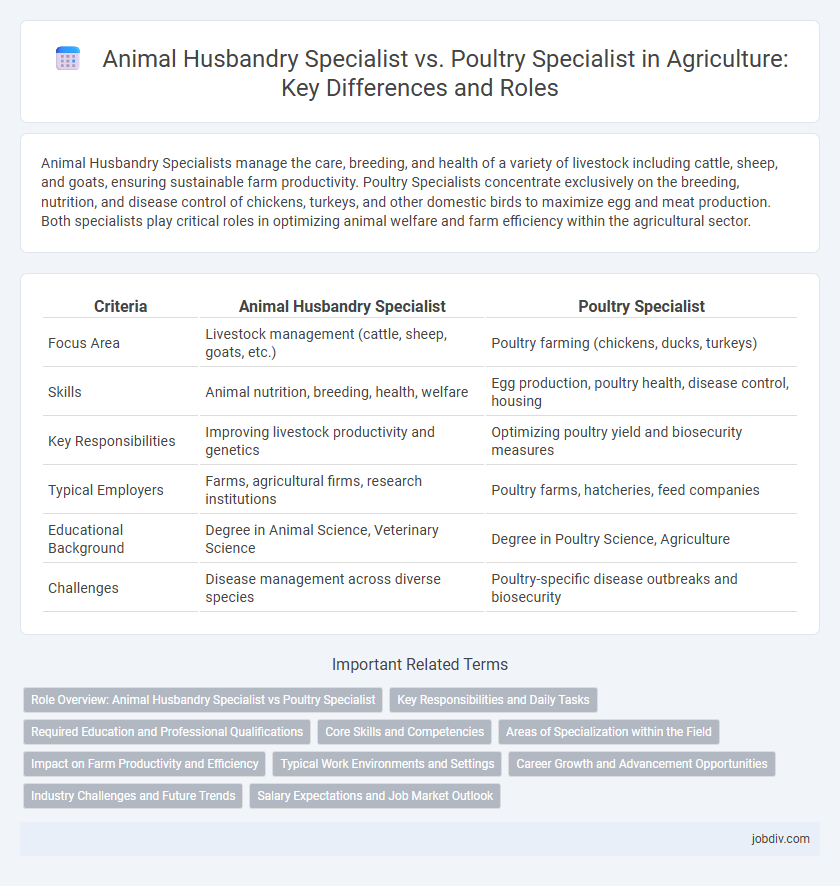Animal Husbandry Specialists manage the care, breeding, and health of a variety of livestock including cattle, sheep, and goats, ensuring sustainable farm productivity. Poultry Specialists concentrate exclusively on the breeding, nutrition, and disease control of chickens, turkeys, and other domestic birds to maximize egg and meat production. Both specialists play critical roles in optimizing animal welfare and farm efficiency within the agricultural sector.
Table of Comparison
| Criteria | Animal Husbandry Specialist | Poultry Specialist |
|---|---|---|
| Focus Area | Livestock management (cattle, sheep, goats, etc.) | Poultry farming (chickens, ducks, turkeys) |
| Skills | Animal nutrition, breeding, health, welfare | Egg production, poultry health, disease control, housing |
| Key Responsibilities | Improving livestock productivity and genetics | Optimizing poultry yield and biosecurity measures |
| Typical Employers | Farms, agricultural firms, research institutions | Poultry farms, hatcheries, feed companies |
| Educational Background | Degree in Animal Science, Veterinary Science | Degree in Poultry Science, Agriculture |
| Challenges | Disease management across diverse species | Poultry-specific disease outbreaks and biosecurity |
Role Overview: Animal Husbandry Specialist vs Poultry Specialist
Animal Husbandry Specialists manage the overall health, breeding, and nutrition of various livestock including cattle, sheep, and goats, aiming to improve productivity and sustainability in diverse farming systems. Poultry Specialists focus specifically on the care, breeding, nutrition, and disease management of domesticated birds such as chickens, turkeys, and ducks to optimize egg and meat production. Both specialists apply veterinary knowledge and husbandry practices but differ primarily in the species they manage and the scale of their specialized production systems.
Key Responsibilities and Daily Tasks
Animal Husbandry Specialists focus on breeding, nutrition, health, and welfare of livestock such as cattle, sheep, and goats, ensuring optimal productivity and disease prevention. Poultry Specialists concentrate on managing poultry production, including hatchery operations, feed formulation, biosecurity, and monitoring flock health for efficient egg and meat output. Both roles require data analysis, record-keeping, and compliance with agricultural regulations to enhance animal growth and farm profitability.
Required Education and Professional Qualifications
Animal Husbandry Specialists typically require a bachelor's degree in animal science, agriculture, or a related field, with some positions demanding advanced degrees or certifications in livestock management. Poultry Specialists often need specialized training in poultry science or veterinary medicine, with certifications in biosecurity and poultry health highly valued. Both roles benefit from practical experience through internships or apprenticeships, emphasizing hands-on knowledge in their respective animal care practices.
Core Skills and Competencies
Animal Husbandry Specialists possess expertise in livestock management, breeding techniques, nutrition, and disease control for cattle, sheep, goats, and other animals, emphasizing animal welfare and productivity optimization. Poultry Specialists focus on poultry-specific skills including flock management, egg and meat production, biosecurity measures, and disease prevention tailored to chickens, turkeys, and other birds. Both roles require strong knowledge in veterinary care, farm management, and data analysis but differ in species-specific practices and production system nuances.
Areas of Specialization within the Field
Animal husbandry specialists focus on the care, breeding, and management of a wide range of livestock including cattle, sheep, goats, and swine, emphasizing nutrition, health management, and reproductive techniques. Poultry specialists concentrate specifically on the raising and production of birds such as chickens, turkeys, and ducks, with expertise in poultry nutrition, disease prevention, and housing systems. Both roles require in-depth knowledge of animal physiology and farm management but differ significantly in species-specific practices and production goals.
Impact on Farm Productivity and Efficiency
Animal Husbandry Specialists improve farm productivity by enhancing livestock health, breeding practices, and nutrition management, leading to higher yields of milk, meat, and other animal products. Poultry Specialists focus on optimizing poultry health, feed efficiency, and egg production, significantly boosting poultry farm output and reducing mortality rates. Both roles contribute to farm efficiency through targeted expertise, but Poultry Specialists typically deliver faster returns due to shorter production cycles in poultry farming.
Typical Work Environments and Settings
Animal husbandry specialists typically work on livestock farms, ranches, and agricultural research facilities, managing cattle, sheep, goats, and other farm animals. Poultry specialists are primarily based in commercial poultry farms, hatcheries, and processing plants, focusing on raising chickens, turkeys, and ducks for meat or eggs. Both specialists often collaborate with veterinarians and agricultural scientists in laboratory or field settings to optimize animal health and productivity.
Career Growth and Advancement Opportunities
Animal Husbandry Specialists often experience diversified career growth opportunities across livestock management, breeding programs, and veterinary services due to their broad expertise in multiple animal species. Poultry Specialists typically advance within specialized sectors such as poultry farm management, hatchery operations, and avian health research, benefiting from the industry's high demand and technological advancements. Both careers offer pathways to leadership roles, research positions, and consultancy, with advancement tied to additional certifications, practical experience, and sector-specific knowledge.
Industry Challenges and Future Trends
Animal Husbandry Specialists face challenges such as livestock disease management, genetic improvement, and sustainable feeding practices, while Poultry Specialists focus on controlling avian diseases, optimizing broiler growth rates, and improving egg production efficiency. Both sectors are increasingly adopting precision farming technologies and data analytics to enhance animal welfare and productivity. Future trends emphasize integrating biotechnology, improving environmental sustainability, and addressing antimicrobial resistance across both animal husbandry and poultry industries.
Salary Expectations and Job Market Outlook
Animal Husbandry Specialists typically earn an average annual salary ranging from $45,000 to $65,000, reflecting their expertise in livestock management across various species. Poultry Specialists often command salaries between $40,000 and $60,000, driven by the growing demand in commercial poultry production and disease control expertise. The job market outlook for Animal Husbandry Specialists remains steady with opportunities in farms, research institutions, and agribusiness, while Poultry Specialists experience faster growth due to increased poultry consumption and the industry's focus on biosecurity and sustainable practices.
Animal Husbandry Specialist vs Poultry Specialist Infographic

 jobdiv.com
jobdiv.com